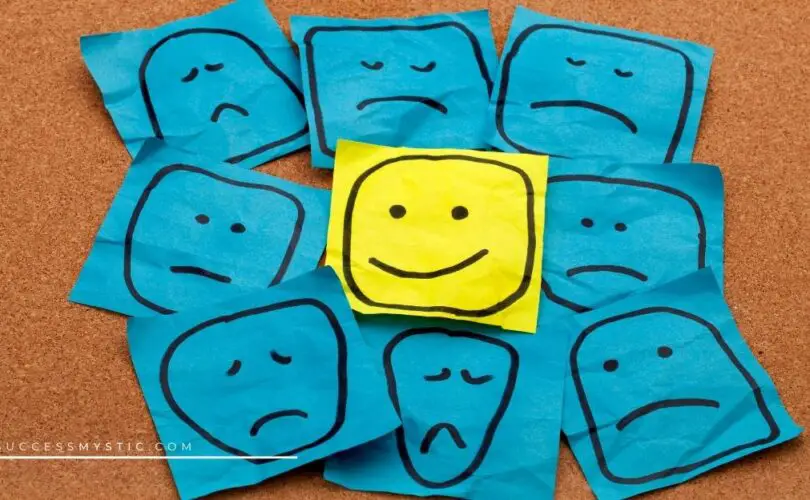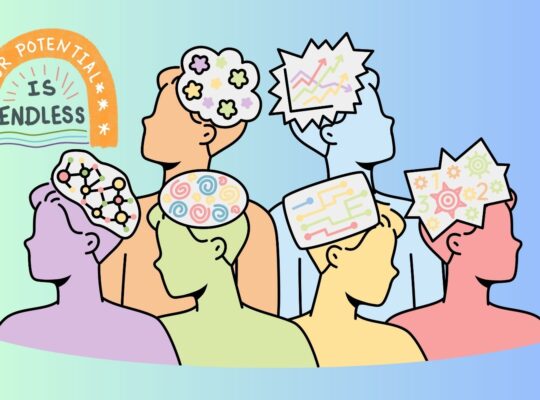What it Means to Have a Positive Attitude
The right attitude can make a tremendous difference in your life. How you think and what you believe controls your behaviors and emotions and affects the outcomes of your choices. A positive attitude has been shown to improve not only your happiness level but also to help you be more successful and enjoy more positive outcomes in your life.
If you are ready to transform your life, then it is time you created and nurtured a more positive attitude, and this guide will help you learn how to do just that.
Before we explore ways to create and nurture your positive attitude, it is helpful to have a definition, so that you know what it is toward which you are working. What does it mean to have a positive attitude?
While it encompasses many things, a positive attitude is, in general, a state of mind that expects and can envision favorable outcomes for your life. Having a positive attitude is often equated with believing that everything will, in the long run, be all right.
Having a positive attitude is aligned with specific characteristics or mindsets. Some of the ways you can tell if someone is more positive is if they:
- are willing to try new things.
- generally, see the good in other people.
- look at the bright side of most situations.
- are optimistic about the future.
- use positive thinking regularly.
A positive attitude allows you to focus primarily on the good, even when times are tough. This type of mindset can help you see and recognize opportunities where others may see none or only trouble. When you have a positive outlook, you acknowledge and build on the accomplishments and gifts in your life rather than dwelling on your failures or the obstacles in your way.
Because a positive attitude means that you generally expect good things to happen, most positive people are also happy, easy to spend time with, and want to share their good fortune with others. Instead of dwelling on what has gone wrong in the past or the current challenges you may be facing, the positive attitude allows you to learn from the past and move forward productively.
Not only does having a positive attitude help you to enjoy life more personally, but it also enhances your relationships with others, gives you confidence that you can handle the rough spots in life, and builds your self-esteem. Most people with this type of outlook are not afraid of challenges and have more resilience than those who tend to see things more negatively.
When you have a positive attitude, you are much more likely to lead a happy and productive life. And learning how to cultivate and nurture this type of mindset can help you enjoy more success, achieve more meaningful goals, and develop more as a person.
Why a Positive Attitude is Important in Life
So, now that we are clear about what a positive attitude looks like, let’s explore how this type of mindset can influence your life. You may not realize all the ways that positive thinking can affect you, including your health, your relationships, your job opportunities, and your overall success and happiness. Here are some of the most important ways that having a positive attitude can change your life.
Being Positive Helps You Feel More Happiness
When you cultivate positivity, you learn to experience true happiness, and you feel this way more often in your daily life. A positive mindset helps you realize that you already have what you need to be happy, and it does not take money or fame to achieve real contentment and joy.
Your positive frame of mind helps you remain happy no matter the circumstances in your life because happiness comes from within. Once you adopt a positive attitude, you can see that you do not need to lose ten pounds or get that promotion to be happy. You can choose happiness right now, and you can choose it whenever you want in life.
A Positive Mindset Provides More Opportunities
When your attitude is positive, people are more likely to like you and feel like they can approach you. They are also more likely to help and look out for you. In work settings and networking situations, your positive attitude will be remembered, and people will be drawn to your positivity.
When you have this optimistic outlook, people are more likely to offer you opportunities, and you are more likely to see potential than others who are not as open to new changes or possibilities.
Positivity Helps Improve Your Self-Esteem
Those with a positive mindset are much more likely to think better of themselves and to see themselves in a positive light, which shows higher self-esteem. Your attitude determines your confidence, how much courage you feel in the face of adversity, and controls your reserves of inner strength, as well.
Having a more favorable opinion of yourself and your abilities means that you are more likely to find solutions to problems and set higher goals for yourself. And when you have more value in yourself, others will see this and treat you accordingly, as well.
Your Positive Attitude is Good for Your Health
When you think positively, you are more likely to take better care of your body, engage in healthy habits, and watch out for your health. Positive people see the long-term benefit in healthy habits that may not very “fun” in the moment but will help you enjoy a happy life for longer.
Plus, a positive mindset means you are more likely to recover from illness or injury because you know there is much to live for. Your mindset is a powerful influence on your immune system, which keeps you healthy and strong, too.
Positivity Leads to Greater Success
When you think positively, you can accomplish more of your goals and dreams, and you will be presented with more opportunities for assistance along your path to success. A positive attitude leads you to believe in yourself and your goals, which provides you with more motivation to help you succeed.
When you have this type of mindset, you are more likely to overcome obstacles or learn from failures that can help lead to later success. Those with a positive attitude are more likely to attain their dreams and get what they want because they believe that they can and should succeed.
A Positive Outlook Improves Your Relationships
Whether you are talking about romantic partners, friends, family, or colleagues, your positive attitude will strengthen your connections with other people. Those with a positive outlook attract others to them, and this can make it more likely that people will be attracted to you, want to spend time with you, and to recommend you for promotion or advancement at work.
People respond to joy, happiness, and positive energy because you are showing them what they want to be. Plus, positivity puts people at ease and makes people relax when they are with you.
Your Turn: What’s Your Attitude?
So, we know why your attitude is important, but how sure are you of your own perspective? Are you a positive person? Or does your attitude lean more toward the negative end of the spectrum? Let’s take a look, so you will know if you need to nurture more positivity in your own attitude and mindset.
Before self-assessing, start with a commitment to total honesty. You want to examine yourself as you really are, right now, not as you think you should be or want to be in the future. There is no wrong answer. The purpose of self-evaluation is to show you where you have strengths and where you have room to grow. Knowing this will help you identify ways you can improve your attitude, and only through total honesty can you hope to figure out how to improve your attitude.
For each of the following questions, consider how often you engage in a particular behavior or how much the statement describes you. Is this something you never or rarely do, is this something you may sometimes, often, or very often do? Does this sound a lot like you or not all like you? Read each carefully and write down your answers as you are going through.
1. When I succeed at something or receive recognition for my work or abilities, I believe it is because I am better than others. For example, if my team at work is awarded a large contract, I think that is because my team is better and worked harder than the competition.
2. When a group I am involved with is not functioning well together, I believe that, whatever the cause, the problems will be short-lived, and a solution can be found. For example, if my spouse and I are not communicating well now, I believe there is a way to remedy the problem, and after that, things will be better.
3. When I finally reach a long-term goal or overcome a personal challenge, I spend time congratulating myself and reflect on all the skills I learned and used to reach this milestone.
4. When I am serving in a leadership role and my team experiences success, I attribute that to the hard work and skills of all the team members rather than assuming it is merely because of my leadership skills.
5. When something goes wrong involving a group of people, I can see how everyone made contributions that led to the mistakes that were made. I do not automatically blame myself for the setback or assume I lack the right skills.
6. I know that, when I make a choice or decision that leads to success, it is because I have the right knowledge or expertise and that I analyzed the situation thoroughly. I trust in my abilities and do not just assume I got lucky.
7. When I am able to do well, such as complete a work assignment or solve a tricky problem, I know it is because I am smart and talented and not just because I was good at that one, specific thing.
8. When my boss or my spouse says they want to talk with me, I automatically assume that I have done something wrong or there is a problem.
9. When I am not selected for something I really want to do; I usually believe it is because I am just not good enough or generally unskilled.
10. When I come up with a great idea or a creative solution, it surprises me, and I assume I just got lucky. I know that it is not likely to happen again.
11. When something goes wrong, whether at home or work, I let it affect how I feel about the other aspects of my life. I tend to feel negative about everything when one thing is not right.
12. If something good happens and people reward or recognize me in some way, I usually think it is a matter of luck rather than my actual abilities or work. For example, if I were to be chosen to speak at our annual meeting, I would assume no one else wanted to do it.
13. If I have a setback or encounter an obstacle, I usually believe that this will become a long-term problem. Often, I allow these circumstances to decrease my motivation or willingness to continue working on something.
14. When something bad happens that bothers me, I usually attribute it to a more widespread cause that will continue to haunt me. For example, if someone forgot to include me on a guest list, I assume all my friends are now against me.
As you can probably tell, the first seven questions are worded more positively and the last seven more negatively. Look at your answers to see if you tended to agree more or perform certain types of behaviors more regularly.
- Does your attitude lean more toward the positive or the negative?
- Are you squarely in the middle, slightly to one side or the other, or do you lean heavily in one direction?
Reflect on your answers carefully to determine where in your life you need to make some adjustments before you begin the next section.
There are many online assessments available, as well, that will calculate a “score” to tell you more about your attitude and help you identify some possible problem areas, as well. These change all the time, and a simple online search will yield many results.
Creating and Nurturing Your Positive Outlook
While tapping into the power of positive thinking may seem a little trite, there is enough scientific evidence to suggest you should. Having a positive mindset is known to help improve your health and lead to greater happiness and success in life, so why wouldn’t you want to nurture this attitude in yourself?
If you are starting to realize that perhaps your negative outlook or pessimism is interfering with your ability to get what you want in life, then you are ready for a change in attitude. Below, we describe many strategies for developing a more positive outlook. The more you practice them and embrace their purpose, the more optimistic you will begin thinking.
Find the Positive in Everything
No matter what is going on in your life, no matter the obstacles you are facing, there is always something positive to which you can look. When life hands you lemons, you are learning and growing as you find ways to navigate the problems. Focus on these benefits.
Find something positive in every situation, no matter who difficult it may seem. And the more you start looking for positive aspects in your life, the more often you will see them when you are not looking, as well.
Remember Who Is in Charge of Your Attitude
Your attitude is not just something that happens without your consent. You decide every day how you interpret what is going on in your life. There is no one else who can MAKE you feel a certain way, and you are the one who gets to decide how to react to the good and bad things that happen in your life.
So, get up every morning and choose to be positive. Choose to make a concentrated effort to think more optimistically and to watch out for negative thinking throughout your day.
Use Positive Affirmations
Your morning routine is what sets the tone for your entire day. When you wake up feeling negative, anxious, rushed, or sad, then guess how the rest of your day will feel? So, starting your day with a positive mindset can really help keep you on track. Start each morning with some positive affirmations to get your mind moving in the right direction.
While laying gin bed, taking a shower, or driving to work, say positive statements about your day. “I am going to feel positive all day,” “Today is going to be a great day,” and “I am going to be successful today,” are all examples of positive affirmations to start your morning.
Write in a Gratitude Journal
At the end of each day, spend just a few minutes recording those things for which you are most grateful about your day. Gratitude begets gratitude, and the more you focus on the positive things that are happening in your life, the more positive things will happen.
When you focus on gratitude, you push away negativity and pessimism in favor of more positive thoughts. When you spend the last part of your day focused on your appreciation, and combine this with positive morning affirmations, you are bookending your day with positivity.
Start Thinking About Challenges Differently
Most people with a cynical attitude look at challenged, setbacks, and failures as things you want to avoid in life or something that must be “overcome.” If you change your mindset about challenges, though, and instead focus on what you can learn from these experiences, you can have a more positive approach to these unexpected parts of life. Every obstacle represents an opportunity to learn.
Each setback is not a failure but merely a failed attempt from which you can learn and try again. There is no reason to regret the past because it teaches us something and makes us who we are today. Learning to think in new and more positive ways about these types of experiences in our lives reminds us that there is always something good in every dark time.
Cultivate a Positivity Library
Whether you prefer images, podcasts, blog articles, books, or videos, create a collection of positive and inspirational messages that you can turn to regularly. Whenever you hear negative thoughts creeping in or find yourself struggling to overcome a darker outlook, you can reach for your library and watch, listen, or view your collection to help you find positivity.
Stay Away from Negative Media
The media today is full of hateful rhetoric, mean commenters, and negative reporting about the world. If you watch is all the time, it is no wonder you are struggling to feel anything but frightened, miserable, or paranoid.
When you surround yourself with negative media, it influences your own attitude and outlook. Focus on getting news and information in short bursts, set up alerts for topics you care about so you can ignore the rest, and take a break when you need to for your sanity and positivity.
Watch How You Talk to Yourself
Self- talk is how we communicate internally. It is the voice inside your head, and you may not realize what an influential role it has in your ability to remain positive. Listen carefully to your self-talk, and when you hear negative words being used or notice that you are not treating yourself with kindness or love, stop that voice in its tracks.
Replace negative messages to yourself with more positive ones. It takes intention and focus to become aware of and change these internal messages, but once you do, you will notice a significant change in your attitude.
Get Rid of Negative People in Your Life
Every time you are around people that consistently whine and complain, their negative energy and attitude affects you. And when you are around negative people, you are much more likely to be negative yourself. And negative people dislike other people who are happy, so they will often try to sabotage your positivity. Negative people would rather drag you down to their misery than allow you to lift them up, so it is easier and healthier for you just to walk away.
Watch Your Language
The words you use say a lot about your attitude and can help nurture a more positive outlook. When you say words aloud, you are programming your mind how to think, so choosing to use positive vocabulary can help you cultivate a more optimistic outlook. Erase words like “never,” “impossible,” and “can’t” from your vocabulary and focus on ways to put a positive spin on things.
When someone asks how you are today, you do not have to lie if you are genuinely upset, but you can tone down the emotionally charged words you use to describe your mood. Just saying you are “upset” versus “furious” can help calm you down.
Another way to use your words to change your attitude is by replacing the word “have” with the word “get.” This transforms obligations into opportunities. You do not have to go to work; you get to make a difference today.
You do to have to go grocery shopping; you get to buy healthy food that nourishes your body. Get is a word of gratitude that helps you rethink how you spend your time and what is important to you.
Live in the Present
Many times, our negative thoughts stem from things that happened in the past or worries we have about the future. Instead of living in the present, our minds wander off into times and situations we cannot control, which leads to feeling like your life is out of your control. Focus instead on what is happening right now.
Put this moment into perspective of right now, this minute. Is what is happening right now so awful or harmful, or are you just placing a lot of meaning on it based on your past experiences or what you think might happen in the future? Living in the moment can help you feel more positive about most situations.
Stop Complaining
Complaints do not solve problems, and they only serve to destroy your positive attitude. Complaining about the freezing weather will not make you warmer or alter the climate. It just makes you feel worse about life.
Complaining is a sure path to more negative emotions and a pessimistic outlook, so stop this habit now. Avoid people who complain incessantly, and when you hear yourself starting to complain, find something more productive to do with your life.
Breathe Deeply
Deep breathing exercises are an excellent way to reduce stress, bring your mind back to the present, and help you develop perspective that can lead to a more positive outlook.
Meditation and deep breathing allow you to control your thoughts, stop the cycle of negative emotions, and bring you back to what is happening here and now.
Changing how you breathe can change how you think and feel, so why not give it a try?
Cultivate Positive Influences
Just as you want to get rid of the negative people in your life, you should focus on cultivating more positive relationships. We all need friends, mentors, and loved ones, and the more time you spend with people who have a positive attitude, the more likely you are to build this in yourself, as well.
Fill your life with positive people and seek out mentors who have learned how to become more positive themselves so that you can learn from their experiences.
Focus on Solutions
Having a positive attitude does not mean you are unaware of problems or might have a difficult day now and then. But positive people are much more likely to come up with ways to improve the situation than just focusing on what is wrong.
This is especially true if you want to offer feedback to other people. If you have criticism to offer, ensure that you are also suggesting solutions or offering to help make the situation better.
Final Thoughts
Building a more positive attitude is not difficult, but it will take time and dedication. Through intentional focus on how you think, the words you use, and the influences you allow in your life, you can transform your attitude into one of more positivity and optimism over time.
A positive attitude will improve your mind, spirit and overall wellbeing.
Stay positive and take care!







